Tehran Says Comments By Blinken Aimed At Promoting 'Iranophobia'
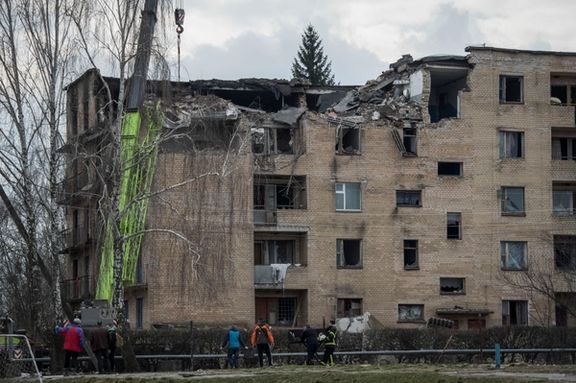
Iran’s Foreign Ministry Spokesman Nasser Kanaani says a recent statement by US Secretary of State about Iran's military program is solely to promote "Iranophobia."

Iran’s Foreign Ministry Spokesman Nasser Kanaani says a recent statement by US Secretary of State about Iran's military program is solely to promote "Iranophobia."
In a tweet on Thursday, Antony Blinken had said that Washington is firmly committed to disrupting Iran’s military procurement activities.
“We are designating entities from Iran and the People’s Republic of China involved in such destabilizing behavior,” he added.
Kanaani stated in a press release on Sunday that such remarks are “aimed at selling American weapons by fomenting the failed project of Iranophobia and creating division among regional countries.”
He claimed that Iran's military program is solely “defensive and deterrent” in nature and is not directed against any country that would not consider aggression against the Islamic Republic.
Iran has been supplying drones, rockets, missiles and other weapons to a host of militant proxy groups throughout the Middle East, and has sent hundreds of suicide drones to Russia that have been used against Ukraine.
On April 19, US Department of the Treasury’s Office of Foreign Assets Control (OFAC) designated six persons and one entity involved in Iran's acquisition of electronic components for its destabilizing military programs.
OFAC has issued multiple rounds of designations targeting Iran's UAV and missile programs, to include elements involved in production, procurement, and proliferation.
“Treasury will continue to enforce its sanctions against Iran’s military procurement efforts that contribute to regional insecurity and global instability,” Under Secretary of the Treasury for Terrorism and Financial Intelligence Brian E. Nelson said recently said.
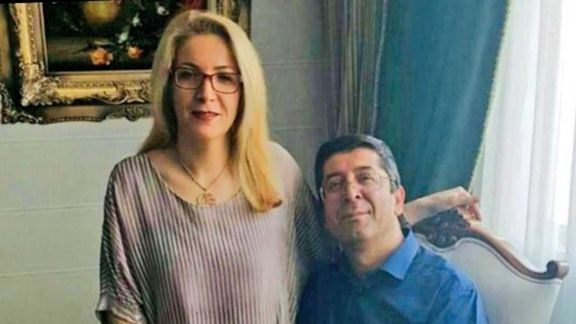
The ordeal of a doctor and his wife in Iran who evaded execution but received long sentences for simply participating in a protest has caught public attention.
Dr. Hamid Qarahassanlou (Ghara-Hasanlou), a fifty-four-year-old radiologist, and his wife Farzaneh were arrested in November in Karaj during protests in which a member of the Basij militia, Ruhollah Ajamian (27), was beaten to death by angry protesters but both have denied any involvement in the incident.
Qarahassanlou was initially sentenced to death and his wife to twenty-five years prison, but their sentences were later reduced due to a strong backlash on social media and lack of evidence of their involvement in a second trial.
Yazd and Mashhad, where Hamid and Farzaneh Qarahassanlou will serve their sentences respectively, are nearly 1,000, and 670 kilometers away from their hometown of Karaj.
A statement by the family released on social media Friday, after the announcement of the new sentences Tuesday, said even the footage of the incident made by security agents proves that the couple were not involved in the killing and were only present on the scene on the way home from a protest in Karaj, near Tehran, on November 3.
“He now has to be exiled [to a prison] in Yazd for fifteen years for not having saved the life of that Basiji in the fracas [of the moment] as a humane doctor,” the statement said while describing the very violent arrest of the couple which they say has hugely affected the couple’s teenage daughter.
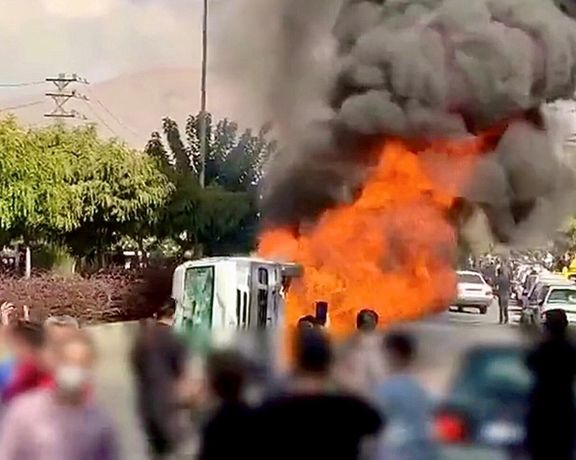
The large protest rally that turned very violent after security forces attacked protesters was held to commemorate a young girl, Hadis Najafi, who was shot to death by security forces forty days earlier.
“The crime [for which they were punished] was and is nothing other than participating in Hadis Najafi’s 40th day memorial,” the statement said.
Two young protesters, Mohammad Mehdi Karami (22) and Mohammad Hossein (39), were executed over Ajamian’s death in January after a hasty trial which human rights activists have called a travesty of justice.
All of the accused, including Qarahassanlou, were reportedly severely tortured to obtain “confessions” and the hardliner Judiciary assigned lawyers despite several prominent lawyers volunteering to defend them.
The lawyers assigned by the court did very little to defend the accused according to family members.
The convictions were not based on a criminal charge related to the murder per se, but they were charged with ‘moharebeh’, meaning “war against God”, a vague religious concept. The Islamic Republic applies the charge to people who might get into a confrontation with security forces during protests.
The first two hangings triggered strong international condemnations and hundreds of lawmakers in Europe and Australia began sponsoring Iranian detainees in danger of execution to generate publicity and impact their fate.
Twelve other protestors have been jailed for up to 15 years for the Basij agent’s death.
The couple were badly beaten during the arrest and later in detention. Qarahassanlou underwent surgery three times for several broken ribs and damaged lung and the family say he has partially lost his eyesight as a result of the beatings.
The couple who belong to the persecuted Sufi Gonabadi Order were known for active involvement in charitable efforts including building schools for underprivileged children.
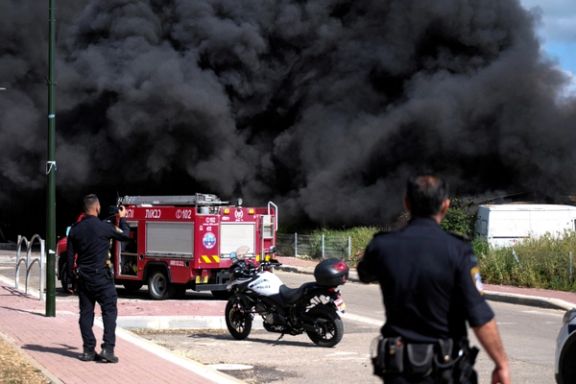
Politicians close to the core of the Iranian regime have increased their anti-Israel rhetoric as Tehran boasts of destabilizing its arch enemy by proxy attacks.
At the same time, Israeli officials are visibly angry at what they insist is Iranian orchestrated multi-front attacks, from Gaza, Lebanon and even Syria.
On April 15, the Spectator wrote about "The dangerous shadow war between Iran and Israel" and quoted regional affairs analyst Kim Ghattas as saying in her new book, The Black Wave, that the recent "Saudi-Iran peace deal might be based on the KSA's judgment that Israel will attack Iran sooner or later."
The Spectator, said Iran is likely to continue to use its proxy groups in the region against Israel and further quoted Ghattas as saying, "There is no change to Iran’s foreign policy, except for some cosmetic changes to allow the supreme leader some space and time to figure out how they’re going to ensure the survival of the Islamic Republic."
A Foreign Affairs report in February pointed out that "Israel has long made clear its penchant for applying military pressure to disrupt Iran’s nuclear advances and weapons exports—and, more recently, its drone technology program."
The publication added that "In the last few months, however, Israel’s appetite for risk seems to have increased." Israel's past weeks' attacks on Iranian targets in Syria seems to have proven the Foreign Affairs' argument.
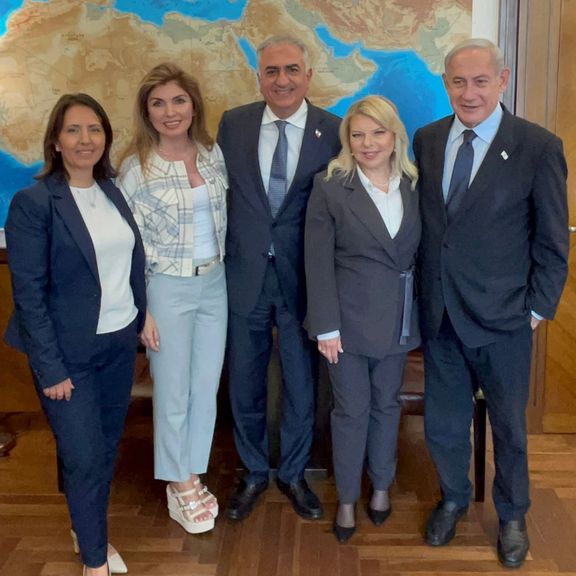
And last but not least, the Times of Israel quoted former Israeli National Security Adviser Yaacov Amidror as saying that "Israel must prepare for war with Iran without US help."The Times of Israel further quoted Amidror as saying that “We need to prepare for war. It’s possible that we will reach a point where we have to attack Iran even without American assistance.”
In Iran, in a message to his counterparts in Muslim countries, the Speaker of Parliament Mohammad Bagher Ghalibaf wrote on Friday, "The Islamic ummah [nation] can see the destruction of Israel thanks to their profound unity." In the message that was carried by IRGC-linked Fars News Agency, Ghalibaf reiterated that the liberation of Quds [Jerusalem] is one of the highest ideals of Muslims.
Meanwhile, the Friday Prayers Imam of Kangan, in southern Iran, Mahmoud Mahmoudi spoke about the recent visit to Israel by Prince Reza Pahlavi, the former Crown Prince of Iran, and said "The Iranian nation will send their message to Israel with the Resistance's missile, not by Reza Pahlavi."
The cleric was referring to Prince Reza's statement in which he said that his visit was aimed at carrying Iranian nation’s message to the people of Israel. Reports on social media and foreign-based Persian television channels indicate that the prince's visit to Israel was welcomed by Israeli officials and Iranian expats in Israel.
Mahmoudi referring to Iran's proxy groups in the region including the Lebanese Hizballah, claimed that "the resistance forces have opened the doors of hell to the Zionists who are now encircled by the resistance."
Earlier, on Thursday, the Friday Imam of Mashhad, firebrand cleric Ahmad Alamolhoda referred to possible Israeli attacks on Iran and threatened that, "If there is going to be any stupidity and aggression, all of the US bases in the region will be destroyed in the region."
In another development on the same day which marked the Army Day in Iran, President Ebrahim Raisi who reviewed the troop on the occasion, threatened Israel while watching obsolete US warplanes produced in the 1960s and 70s fly over the area by saying that "The smallest error by Israel, will lead to the destruction of Haifa and Tel Aviv."

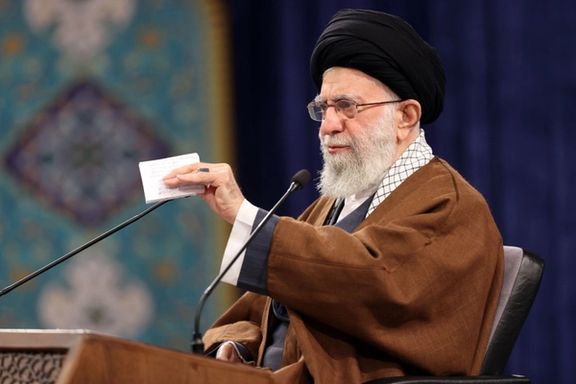
Iran’s Supreme Leader Ali Khamenei says the strategy of the Muslim world should be reinforcing the militant groups in the Palestinian territories.
Khamenei said in a Saturday meeting with regime officials and ambassadors of Muslim countries that Israel is gradually collapsing, and the Muslim nations must focus on supporting the militant elements in and around Israel.
While renewing his support for jihadists in Palestinian territories, Khamenei alleged that “The downfall [of Israel] which started a few years ago, has now accelerated and the Muslim world must take advantage of this great opportunity.”
Earlier, an Iranian IRGC Commander also hailed Palestinian terror groups, claiming 10,000 attacks have been perpetrated against Israelis this year.
Ramazan Sharif, the head of the Intifada and Quds Central Headquarters of the Islamic Propaganda Coordination Council, said earlier this month that the formation of a unified anti-Israeli front from South Lebanon and the Syrian Golan Heights to Gaza and the West Bank has challenged Israel more than ever.
Iranian proxies in Gaza, Lebanon and Syria have all recently attacked Israel with rockets as tensions simmered during the holy month of Ramadan.
Khamenei said in 2016 that Israel must be destroyed in 25 years and the government even set up a countdown clock in Tehran the following year.
Many Iranians mock the anti-Israel rhetoric and the ticking clock, but the regime is adamant in repeating its threat.
Iranians who have been periodically protesting against the regime since 2017, often chant slogans against spending Iran's national wealth to create and support proxy groups.
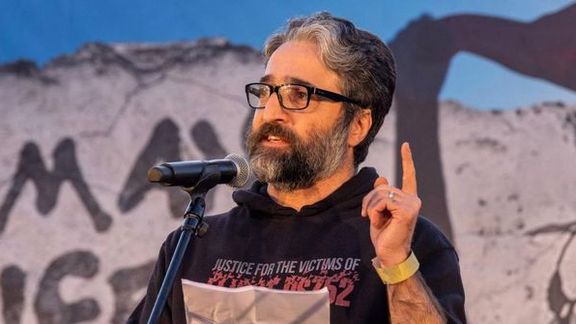
The resignation of Hamed Esmaeilion from the Alliance for Freedom and Democracy in Iran has sparked bitter arguments between monarchists and his supporters.
In a post entitled “Report to the People” Friday, Canada-based activist Esmaeilion announced that he has left the alliance. The council consisted of the exiled Prince Reza Pahlavi, Nobel peace prize laureate Shirin Ebadi , US-based author, journalist and women’s rights activist Masih Alinejad, actress and activist Nazanin Boniadi and Secretary General of the Kurdish Komala Party Abdullah Mohtadi and Esmaeilion.
Boniadi recently deactivated her social media accounts without any explanation and appears to have withdrawn from the alliance too. Alinejad, Mohtadi, and Ebadi have so far not commented on Esmaeilion’s resignation.
The alliance announced its existence in a February event at Georgetown University and issued its charter, the Mahsa Charter, in early March and its members said they had agreed on “minimal positions” that could create the most consensus among the opposition.
Esmaeilion said he joined the opposition in exile council hoping to help create a platform for dialogue and cooperation among various opposition factions but the lack of democracy and transparency in the council and the “domination” of one member over the others disillusioned him.
He claimed that he had tried to keep away from “conflicts, pressures and illogical demands” but was impeded by “pressure groups from the outside” who kept trying to impose their own views on the coalition by “undemocratic methods".
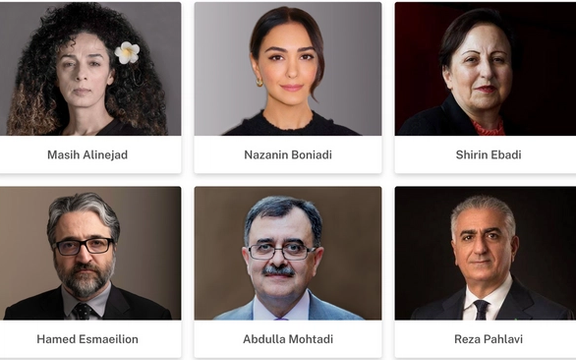
Supporters of Esmaeilion, Alinejad, and Mohtadi have long been accusing the supporters of the exiled Prince of harassment on social media and efforts to defame them. Prince Reza Pahlavi has on some occasions advised his supporters to be more tolerant of others but the disputes and attacks on social media only got worse. They often accuse Prince Reza Pahlavi’s supporters of trying to present the him as the only legitimate leader of the opposition.
Supporters of the Prince who call themselves ‘constitutionalists’ are staunchly against establishing a republic of any form in Iran, particularly federalism, seek the revival of a constitutional monarchy and the Iranian Constitution of 1906. They allege that others, Esmaeilion and Alinejad in particular, have views that will lead to the loss of Iran's national integrity.
Constitutionalists have been particularly angry recently because they believe that Esmaeilion and possibly Alinejad have prevented the Prince from including some opposition figures close to him in the coalition– particularly London-based journalist Amir Taheri, the US-based Amir-Hossein Etemadi, a member of the Frashgard group, and Germany-based musician and activist Shahin Najafi.
"Imposing opinions is not democratic, and the consensus of a group’s members, not just one member, is a precondition of a democratic movement," Esmaeilion wrote without naming Prince Reza Pahlavi directly while further suggesting that there have been efforts to “eliminate” others and impose certain views on others.
He also opined that the opposition abroad should only help to empower the people of Iran, their networks and organizations and that he would personally continue helping young pro-democracy Iranians abroad to organize and work on “unrestricted internet and several other projects” with them.
His critics respond that the six-member council was self-appointed, and no one got elected to block others from joining.
Some social media users have also suggested that the reason for Esmaeilion’s departure from the alliance at this time could have been his opposition to the Prince’s recent visit to Israel.
“Timelines are filled with Esmaeilion’s worthless tweet exactly when articles and tweets must focus on the important and taboo-breaking Israel visit of the Iranian monarch, Prince Reza Pahlavi, and the impact of this visit today and after the reclamation of Iran [from the Islamic Republic]. Isn’t it interesting?” one of the Prince’s supporters tweeted.
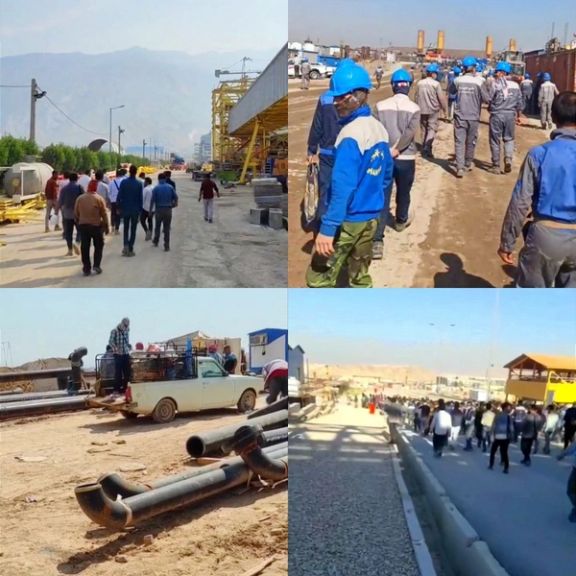
Workers of the oil, gas and petrochemical industries in Iran have gone on strike demanding wage increases in the face of more than 50 percent annual inflation.
Countless contract workers in oil, gas, petrochemical and steel industries in the southern cities of Asaluyeh, Dehloran, Gachsaran, Kangan, etc., stopped working on Saturday demanding a raise based on their proposed list which should be 79%.
At the same time, a conference was held in the city of Cologne, Germany, to express support for trade and civil unions of Iran.
According to reports, over 80 parties and organizations as well as 1,500 activists supported the initiative by the conference.
Back in February, twenty independent trade unions and civic institutions in Iran jointly published a charter, outlining their main demands to end the current inhumane situation.
Wages for most workers are around $120-150 a month, while a family of four needs $450 for its bare minimum needs.
In a statement, they said that 44 years after the establishment of the Islamic Republic the country's economic, political and social situation has plunged into a "vortex of crisis and disintegration."
They added that no clear and attainable prospect can be envisioned to end the current situation within the existing political framework, calling for building a new, modern and humane society after the Islamic Republic.
Outlining 12 main demands, they called for the release of all political prisoners, prohibition of criminalizing political, union, and civil activities, public trial of the leaders and perpetrators of the violence against protesters, unrestricted freedom of opinion, expression and thought, assembly, and social media as well as policies to preserve natural resources and ending environmental degradation.